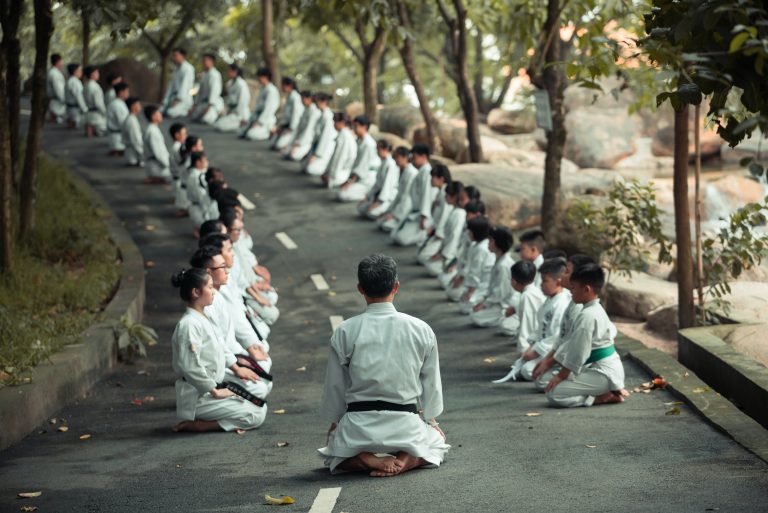Karate: Is it really useful if you don’t fight in a competition?
Karate is a martial art that originated in Okinawa, Japan, in the early 20th century. It is known for its quick and powerful strikes, blocks, and kicks. Karate training involves developing physical fitness, mental focus, discipline, and self-defense skills. However, some people wonder whether karate is really useful if you don’t fight in a competition.
The Benefits of Karate Training
First of all, karate training provides numerous health benefits. It improves cardiovascular and muscular endurance, strength, flexibility, balance, and coordination. Regular karate practice can also reduce stress, anxiety, and depression, and improve self-confidence and self-esteem.
Moreover, karate teaches valuable self-defense skills that can come in handy in real-life situations. By mastering karate techniques such as strikes, kicks, and throws, you can learn how to defend yourself against attackers who might be bigger, stronger, or armed. Karate also teaches you how to avoid dangerous situations and how to use verbal assertiveness to de-escalate conflicts.
Competition vs. Real-Life Fighting
It’s true that karate competitions are popular and widely televised, especially in Japan and other Asian countries. Competitions can be exciting and entertaining to watch, as they showcase the athletes’ skills and tenacity.
However, karate competitions are not the same as real-life fighting. In competitions, athletes follow strict rules and wear protective gear to prevent injuries. They also compete against opponents of similar age, gender, and weight category.
In contrast, real-life fighting can be unpredictable, violent, and life-threatening. In a real-life confrontation, there are no rules, referees, or time limits. You might be attacked by multiple opponents, weapons, or surprise attacks. Moreover, real-life fights can have legal and moral consequences, such as criminal charges, lawsuits, or physical and emotional trauma.
Karate Training for Self-Defense
If your goal is to learn self-defense, then karate training can be very useful, regardless of whether you compete or not. Through regular training, you can improve your physical fitness, mental focus, and awareness, which can help you avoid dangerous situations and react effectively if needed.
You can also practice self-defense techniques with partners who simulate real-life attacks, which can help you develop the skills, reflexes, and confidence needed to defend yourself. Moreover, karate training emphasizes the importance of self-control, discipline, and respect, which can help you avoid conflicts and communicate assertively when needed.
Conclusion
In conclusion, karate is a valuable martial art that can provide numerous physical, mental, and self-defense benefits. While karate competitions can be exciting and impressive, they are not essential for learning self-defense skills. Whether you compete or not, karate training can help you develop the skills and mindset needed to stay safe and confident in real-life situations.
Karate: Is it really useful if you don’t fight in a competition?
Karate is a self-defense technique that has gained immense popularity worldwide. However, many people are skeptical about its effectiveness, especially if you don’t plan to fight in a competition. In this blog post, we will answer some of the frequently asked questions about Karate and its relevance in everyday life.
1. What is Karate?
Karate is a martial art that originated in Okinawa, Japan, and became popular in the 20th century. It primarily focuses on striking techniques such as kicks, punches, and elbow strikes. Karate also includes defensive techniques such as blocks and parries. The art of Karate helps you to gain physical fitness, mental peace, and self-defense capabilities.
2. Is Karate only useful in competitions?
No, Karate is not only useful in competitions. It is more about self-defense than anything else. Karate practitioners learn how to defend themselves by delivering powerful strikes, blocks, and joint locks. The techniques taught in Karate can be applied in real-life situations, such as attacks on the street or during personal confrontations.
3. What benefits does Karate offer other than self-defense?
Apart from self-defense, Karate offers various benefits that are helpful in everyday life. Regular practice of Karate can help you to develop physical strength, flexibility, and agility. It also aids in improving mental health by reducing stress and anxiety. Karate emphasizes self-discipline and mental toughness that help you to develop focus and determination.
4. Is Karate suitable for all ages?
Yes, Karate is suitable for all ages. It is a form of exercise that can be modified according to individual needs. Kids who practice Karate learn discipline, self-control, and self-defense techniques that help them in their daily lives. Adults can benefit from Karate by developing self-defense skills and improving physical and mental fitness.
5. How long does it take to learn Karate?
The time required to learn Karate depends on the individual’s level of dedication, fitness, and natural ability. It takes several years to become proficient in Karate to the level of a black belt practitioner. But, like any other skill, regular practice and training are essential to progress in Karate.
6. Can Karate be learned at home?
It is not advisable to learn Karate at home without proper guidance from a certified instructor. Karate involves physical contact and requires proper guidance to learn the techniques and avoid injury. Learning from an experienced instructor is necessary for proper technique and avoiding bad habits that could harm you in the long run.
7. Do I need to be physically fit to practice Karate?
Karate is a physical activity that requires fitness, but it is adaptable for people of all fitness levels. Karate can help to improve your physical fitness as you progress through the ranks. The physical demands of Karate can also be adjusted to accommodate injuries or limitations due to age or pre-existing medical conditions.
8. Is Karate effective in a real-life situation?
Yes, Karate is effective in real-life situations. However, the effectiveness depends on the individual’s ability to apply the techniques and maintain a clear mind during such situations. Karate practitioners learn to defend themselves against attacks but are also taught to avoid confrontations whenever possible.
9. Is Karate a competitive sport?
Yes, Karate is a competitive sport with various competitions held globally. Competitions help Karate practitioners to test their skills against others and improve their techniques. However, much emphasis is put on self-defense and personal growth rather than competition.
10. How do I choose a Karate school?
Choosing a Karate school can be challenging, but it’s essential to find a school that suits your requirements. Look for a school that has certified instructors with experience and a good reputation. Attend a class or two to see if you like the teaching style and environment. Ask other students about their experience with the school before making a decision.
Conclusion
In conclusion, Karate is an effective self-defense technique that offers multiple benefits to practitioners apart from self-defense. Regular Karate practice can improve physical and mental fitness, discipline, focus, and determination. Karate is not just a sport or a competition, but a way of life that helps you to become the best version of yourself.
Inhaltsverzeichnis






